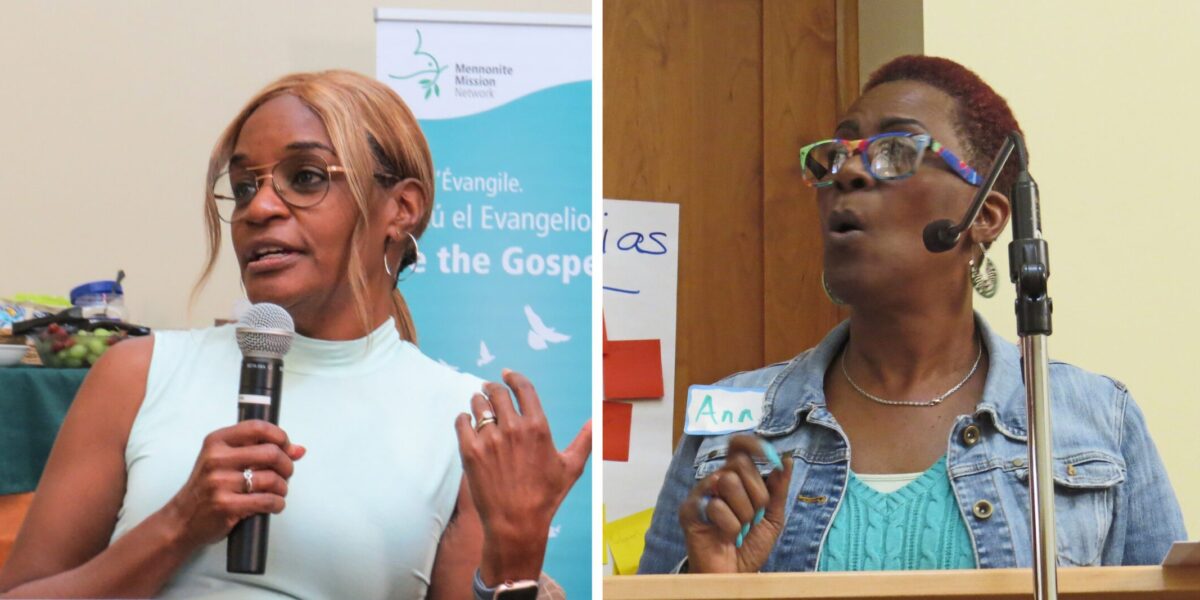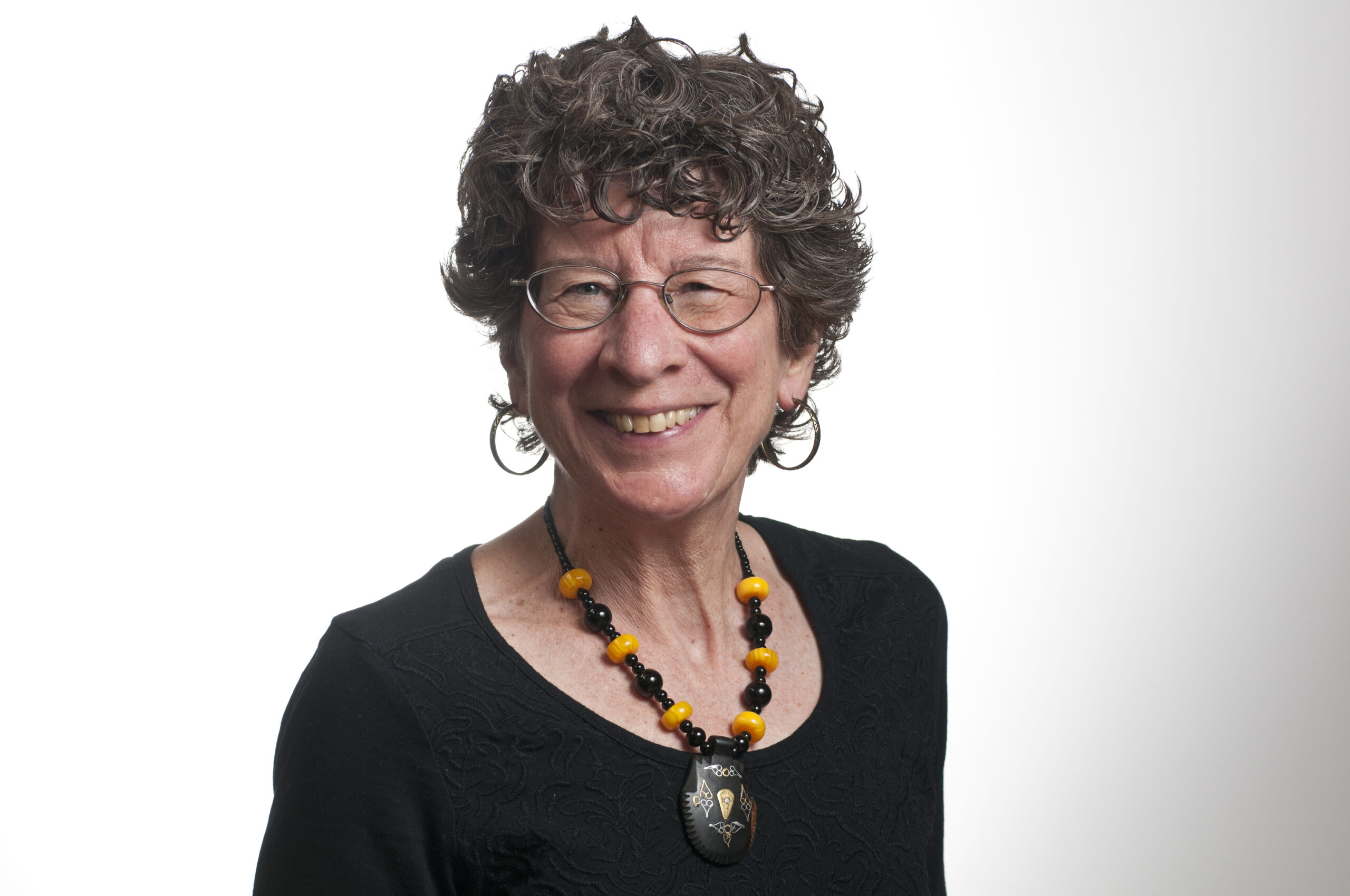In a seminar that adapted Mennonite Women USA’s Sister Care curriculum to the realities of African American life, participants were given tools to manage bias and redeem difficulties.
The murder of George Floyd was a turning point, said Cyneatha Millsaps, as she opened the Leaders Inspiring Leaders seminar that took place on the Elkhart campuses of Mennonite Church USA and Anabaptist Mennonite Biblical Seminary (AMBS), Sept. 29-Oct. 2. Millsaps, a Mennonite pastor and executive director of Mennonite Women USA, was co-organizer of the seminar, along with Ann Jacobs, a specialist in urban and African American ministries, working with the support of Mennonite Mission Network’s training and resource department.
After the whole world watched video footage of Floyd struggling to breathe with Derek Chauvin’s knee on his neck, excuses to remain inactive were no longer acceptable, Millsaps said. "Before [Floyd’s murder] I gave White Americans a pass, because I reasoned that they didn’t know. But, now, we all know."
When Millsaps accepted her position with Mennonite Women USA, in 2018, she began by encouraging women to make friends across cultural and racial divides. She continues to find new ways to achieve that initial goal.
"The White women I met with, in many locations in the United States, really didn’t have a clue as to how to go about [crossing cultures]," Millsaps said. "So, Mennonite Women USA developed the Sisterhood Master Class."
The Sisterhood Master Class builds on the Sister Care curriculum that Carolyn Heggen and Rhoda Keener developed, in 2010, to help women live into their own healing, so they can better care for one another, as they encounter difficult life experiences. Since then, Sister Care has been taught in every conference of Mennonite Church USA and in more than 36 countries in Africa, Asia and Latin America. In 2017, Millsaps and Hyacinth Stevens, Mennonite Central Committee’s East Coast executive director, presented the first Sister Care event adapted to the realities that shape African American women’s lives. The Leaders Inspiring Leaders seminar was the second national presentation led by African American women, with 34 participants registered.
Women spent four days together in worship, learning and fellowship. Photographer: Cynthia Friesen Coyle.
Angie Nelson Deuitch, a diversity consultant and president of the Michigan City (Indiana) Common Council, led the first session of the seminar, with teaching and exercises on using cultural intelligence — the ability to work effectively in diverse contexts — to manage bias —the attitudes and beliefs that influence how people behave. She outlined some of the individual and organizational strategies that are helpful in recognizing bias and breaking out of harmful patterns that cause people to hide important parts of who they are. She described covering up parts of who we are as dehumanizing, but there is a path to being fully human in our diversity.
"We all have bias," Deuitch said. "Bias is a neutral word. If you manage bias with cultural intelligence, it prevents you from reacting unconsciously."
While Deuitch focused, in this teaching, on feelings and relationships, she said that this is just the first step to changing organizational policies, which is essential.
Jane Ross Richer, a seminar participant from Goshen, Indiana, is engaged in two-way mission with Indigenous people in Ecuador and the United States, through Mennonite Mission Network. She said that she was encouraged by Deuitch’s presentation.
"Learning to manage our biases seems so much more hopeful than trying to totally get rid of them," Ross Richer said.
Millsaps and Nelly Moran Ascencio, who is training to be a Sister Care facilitator, led the group through four sessions that focused on a woman’s identity as a beloved daughter of God, caring for oneself and others, listening as healing, and how to help a grieving friend. Biblical passages were studied. Stories were shared. Skills were taught and practiced.
Moran Ascencio told about how difficult life was for her when, at the age of 10, her family moved from Guatemala to Oregon. Mentally looping through "poison stories" is toxic and can keep us trapped in hopelessness, she said. But compassionate listening can transform poison stories into "power stories."
"As women gathered here, we are creating space for each other," Millsaps said. "We follow a savior, who suffered, but we don’t want to suffer. Suffering is in our path. However, suffering is transformed when we suffer together. We are not created to suffer alone. When the world says, ‘You are not good enough; you are not light-skinned enough …’ You need sisters to affirm you."
Each day of the seminar began with worship. Music, led by CreAnne Mwale, was woven throughout the sessions. Mwale is a minister of music at Granger (Indiana) New Salem Church. On the final day of the seminar, worship was shared with Southside Fellowship, a congregation that gathers in the AMBS chapel.
"This is not a performance. We are not here to entertain you," Mwale said of the music ensemble on Sunday. "We have come to worship."
Vikki Pruitte-Sorrells, lead pastor of Lee Heights Community Church in Cleveland, Ohio, preached a sermon based on Mark 16:1-6.
"We thank God for a man named Jesus," Pruitte-Sorrells said. "A huge stone sealed the tomb — a great big old boulder. Some of us cannot get to Jesus because of the stones in our lives."
She named stones of financial difficulty, depression, broken marriages and illnesses, and then, said, "Our troubles are stepping stones to take a step up [out of the pit in which we find ourselves]!"
Pruitte-Sorrells counseled the congregation and seminar participants to lean into Jesus Christ, so he could help bear the stones that they were carrying. She guided worshipers in a liturgical exercise of bringing their stones to the water to be washed, purified and redeemed, reminiscent of baptism.
"The stone [that sealed the tomb] was not to keep Jesus in," Pruitte-Sorrells said. "It was to keep the believers from victory. Rolling the stone away represents redemption for the whole human race. Every day is resurrection day. Resurrection is the audacity to speak out against injustice. Jesus gives us the power and promise."
Many of the participants spoke of how they were drawn to register for the seminar through a spiritual impulse. Rosalind Young, associate minister at Lee Heights Community Church, was one of the women who signed up as soon as she read about it online.
"I just knew, deep in my soul, that I had to come," Young said. "And I haven’t been disappointed. I’ve been blessed."
Judy Murphy, Mission Network’s finance manager, said she gained a lot of new sisters through participation in the seminar. "I am so thankful for the new sisters God has given me."
Jacobs said that the partnership between Mission Network and Mennonite Women USA made it possible to increase the participation of women, representing the rich diversity of our church.
"This gathering was only the beginning. I look forward to building on the relationships that were created during the seminar," Jacobs said.









